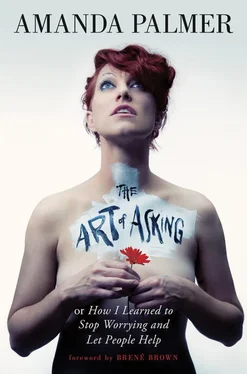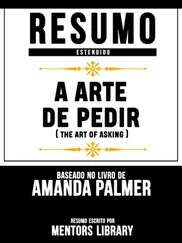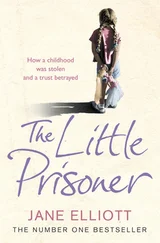None of it. He sounds… like a contender. When do I get to meet him?
• • •
Describing how art and exchange play off each other in The Gift , Lewis Hyde says:
The spirit of an artist’s gifts can wake our own.
In my darkest hours, I still go to my secret stash of medicine-music to comfort me, like a familiar childhood blanket, and cocoon myself in the songs of Kimya Dawson, Leonard Cohen, or Robyn Hitchcock, who seem to be expressing some inexpressible thing inside of me. And listening to those songs performed live, in concert, and sharing that blanket feeling with a crowd of strangers, gives me a feeling of humanhood that I don’t often get to experience; it’s the closest thing I have to church.
When the gift circulates, we feel the very essence of art and life not just in the words and songs, but also in our deep desire to share them with one another.
• • •
You probably don’t know who Edward Ka-Spel is.
Edward Ka-Spel is the singer of my favorite band, The Legendary Pink Dots. They formed in the early eighties in the UK, and they’ve been recording and touring for more than thirty years. They still tour, playing to crowds of hundreds more often than thousands, and their fanbase is like a family. I’m in the family. I joined when I was fourteen and my first boyfriend, Jason Curtis, started making me Pink Dots mixtapes. The psychedelic mash of synthesizers, violins, and drum machines, plus the raw emotional honesty of the lyrics, stole me straight out of the clutches of the “standard” alternative music I’d been listening to (The Cure, R.E.M., and Depeche Mode, mostly). But along with the Pink Dots’ music—which we had to hunt down in used record shops or mail-order from faraway Dutch distributors—came the community.
The first time I saw the band play live was at a small all-ages club in Boston. I was sixteen. I had barely experienced any live rock music, and certainly nothing like this: a band I loved, on a stage five feet in front of me. That night changed my life: I was finally experiencing, in person , the songs that had been the soundtrack of my life for the past few years, the lyric-images I’d memorized after hours of headphone-listening on walks to school, the worlds that had been direct-deposited into my heart through the channel of my ears—I was hearing them here, now, in a moment that would never exist again. I was also standing in a room with three hundred people who seemed to have formed a real, connected comradeship by virtue of Loving One Thing and, by extension, one another. It seemed that this whole scene of people had formed a sort of open secret society around their love of this strange music and the strange guys who played it. I hadn’t even known this was possible. I certainly hadn’t been expecting to meet the band after the show.
Meet the band? I asked Jason.
Yes , he said, they always do this . And he was right: there they were, selling their own CDs and shirts while holding court in the dim light of the club as the grumpy bar crew dismantled the stage. I stood in line, waiting to meet Edward, the main singer and songwriter, trying to think of what I could possibly say that could have any meaning to him whatsoever. My idol. And then, for a short moment, we were face-to-face.
It’s my dream , I said, looking right into his eyes, to make music as honest as yours .
Edward smiled and took my hand. He was as kind and warm as if I were a long-lost friend. We chatted for a minute, what about I’ll never remember. I was awestruck.
I’ll never forget that brief encounter. I didn’t feel like a fan meeting a rock star. I didn’t feel like a groupie. I felt like a friend.
Two years later, when I was about eighteen, The Legendary Pink Dots came through Boston again on tour, and I was lucky enough to be invited to tag along to the after-party at my friend Alan’s house, where the band was also crashing. Alan was an advanced-level computer geek who ran the fans’ online bulletin board system. Late into the night, we sat in Alan’s living room, sharing beer and stories. Jon, another member of the trusted Pink Dots family who hosted the band’s official website, said, out of the blue, Edward, did you know Amanda’s a songwriter? She plays piano. She’s pretty good .
I froze. No no no no no no no , I thought.
Edward looked interested.
Really? he said. Do you have anything we can hear?
Alan, do you have Amanda’s demo tape kicking around? Jon asked.
I’d made a four-track tape recording of a few of my piano songs with a few cheap microphones in my parents’ living room, and Alan had one of the twelve copies in existence.
I think so , said Alan, rummaging around in a milk crate. Yeah! Here it is…
No no no no no no no no .
He popped the tape into the stereo, and I sat there trying not to throw up while Edward and the collected company listened to my piano songs warbling through the speakers.
Hearing my own singing voice paralyzed me, and another voice that I knew intimately rose up inside of me:
I can’t write songs. I can’t sing. I have a fucking phony English accent and THESE PEOPLE ARE ACTUALLY ENGLISH. How humiliating. And god, my lyrics are so pretentious and stupid and self-indulgent. Who the fuck do I think I am?
I wanted to run. I wasn’t ready to be judged, and certainly not here, in this room, by my heroes. After two songs (one a fast-pounding punk rant about my nail-biting habit, the other a dirge about the loss of my virginity set in a metaphorical playground), Alan snapped off the tape player.
There! She’s good, right? Edward and the band nodded affably and the conversation turned back to the show, politics, and other bohemian topics.
I was shaking. I stepped outside to smoke a clove cigarette, and was sitting on the steps in the cold autumn darkness, inhaling sharply and trying to calm myself down, when the door rattled shut behind me. It was Edward. He sat down next to me and lit his own hand-rolled cigarette. I’d never been alone with him before.
I want to tell you something, Amanda .
I had no idea what was coming, but I trusted him to be kind. God, I trusted him more than anyone or anything else in the world at that moment. But I was so afraid.
Yeah? I said, nonchalantly.
Your songs are good, Amanda. And I’m not just saying that .
I stared at him in disbelief.
I get given a lot of music , he continued. It’s like that on the road, you know, we get handed mountains of demo tapes every night. And they’re, you know, not always good. Your songs are good. I don’t know what your plans are. But I hope you keep going. I just wanted to say that .
And he stubbed out his cigarette and went back into the house, leaving me on the porch, feeling an emotion I can only describe as ecstasy. I stayed on that cloud for days, walking around in a fog, thinking that my fate had somehow been decided for me.
Nobody had ever said that to me before. Nobody qualified, at least. Nobody who really counted. I try to recall the enormity of that feeling every time I’m talking to a younger musician who summons the courage to play me their stuff. I bear in mind that I may be the only full-time musician they’ve encountered who’s ever directly said:
Yes. You’re allowed to go do that. Go ahead .
• • •
The next time they came through Boston on tour, I was in college a few hours away and came back home for the show. I talked my parents, god bless them, into hosting five English and Dutch indie rock stars (plus a merch guy and a sound guy) in our suburban house. Some of them slept in the attic, some in the van outside, and I slept over at Jason’s so they could take my bed. Early the next morning, I hurried back to fix them all breakfast before they drove off to the next tour stop. Seeing my favorite band eating in the dining room where my family celebrated Thanksgiving made my brain turn upside down. I had never put so much love into a batch of scrambled eggs.
Читать дальше












